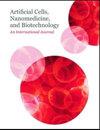聚合胎盘血红蛋白对肾缺血再灌注损伤的影响。
Artificial cells, blood substitutes, and immobilization biotechnology
Pub Date : 2012-12-01
DOI:10.3109/10731199.2012.696062
引用次数: 9
摘要
本研究的目的是研究基于血红蛋白的氧载体(HBOC)是否能减轻缺血/再灌注(I/R)诱导的肾损伤。雄性SD大鼠随机分为假手术组、I/R组和HBOC组(注射0.1 gHb/kg PolyPHb)。双侧肾蒂交叉夹持45min诱导缺血。然后松开钳钳进行24h再灌注。在不升高血压的情况下,PolyPHb降低血浆尿素氮和肌酐,降低肾组织中肿瘤坏死因子-α和白细胞介素-8。因此,我们的研究结果表明,PolyPHb可以减轻I/R损伤后的肾脏损伤,这种作用可能与抑制炎症反应有关。本文章由计算机程序翻译,如有差异,请以英文原文为准。
The effect of polymerized placenta hemoglobin on renal ischemia/reperfusion injury.
The goal of this study was to investigate whether hemoglobin-based oxygen carrier (HBOC) attenuated ischemia/reperfusion (I/R)-induced kidney injury. Male SD rats were randomly divided into a sham group, I/R group, and HBOC group (injection of 0.1 gHb/kg PolyPHb). The ischemia was induced by bilateral renal pedicle cross-clamping for 45min. Then the clamp was released to allow 24h reperfusion. Without increasing blood pressure, PolyPHb reduced the blood urea nitrogen and creatinine in plasma and attenuated the tumor necrosis factor-α and interleukin-8 in kidney tissue. Therefore, our findings suggest that PolyPHb could reduce kidney injury after I/R injury, and this effect was probably associated with the depressed inflammatory response.
求助全文
通过发布文献求助,成功后即可免费获取论文全文。
去求助
来源期刊
自引率
0.00%
发文量
0
审稿时长
6-12 weeks

 求助内容:
求助内容: 应助结果提醒方式:
应助结果提醒方式:


